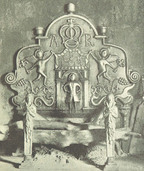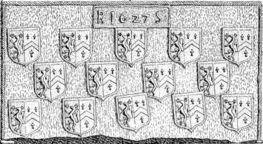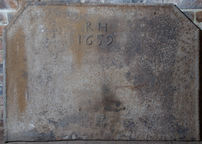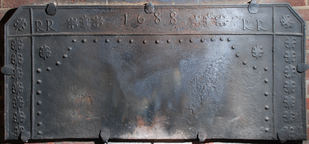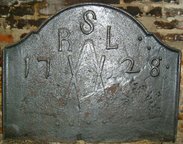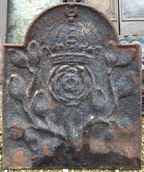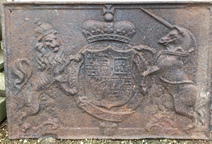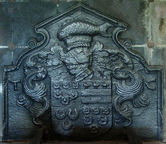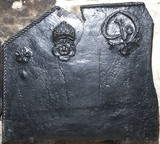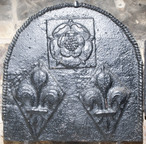-
1210
Description: Individually designed quasi-arched rectangular shape; astragal edging; central portico with framed doorway and sloping roof, in which stands a male figure dressed in contemporary style; above the roof, the date, and above that, the initials TKM arranged in triad and around a flower head, this inscription enclosed within a five-sided ribbon compartment held at the top corners by a pair of mirrored dancing cherubs each of which holds in their outer hand a wand surmounted by a fleur-de-lys; below them are mirrored vine designs terminating in a grape bunch, and below each of them a mirrored swirled snake, its head reversed; towards the outer side of these snakes are a pair of mirrored birds within a curved cartouche of slightly raised relief that is associated with a swirl on each side of the fireback that terminates the astragal edging on each side and which ascends via a step surmounted by a miniature urn on each shoulder of the back to the top which is surmounted by an acorn shape; above the ribbons held by the cherubs, is a stylised crown between the initials AR; the above features are limited by a horizontal astragal, though the portico descends below it, and which is supported at each end by a simple Doric column enclosing the bottom panel which is otherwise plain.
Notes: The initials AR are of Anna Regina - Queen Anne. Finely cast but of naïve design, another fireback of the same design but with different inscriptions and dated 1723 is Bowness on Windermere. Illustration from Cowper, 1899, p.179.
Inscription: A R / TKM [triad] / 1714
- Decoration tags:
- rectangular with round arch (shape)
- astragal (edging)
- whole carved pattern
- individual letters
- individual numbers
- heraldic
- mythological
- text
- humans
- plants
Manufactured: in 1714 possibly at Backbarrow Furnace in the Furness area of England.
Current location: Low Graythwaite Hall, Hawkshead, Cumbria, England.
- Attached to series:
- Rawlinson series
-
1007
Description: Rectangular; twisted rope edging on top and sides; cavetto-moulded-edged rectangle top centre, enclosing date between initials; 14 shields of Ayloffe impaling Sulyard arranged 5-4-5; Ayloffe: sable, a lion rampant Or, collared gules, between three crosses formy of the second; Sulyard: argent, a chevron gules between three pheons inverted sable.
Notes: William Ayloffe (c1535-1584) of Bretons, Hornchurch, Essex, Justice of the Court of Queen's Bench, married (c1560) Jane, dau. of Sir Eustace Sulyard, of Runwell, Essex. A large number of variants use the same shields; this example, unusually, has the initials RS instead of the more common CT. Illustration from Cowper (1911). Previously at Loddenden, Staplehurst, and before that at Great Cheveney, Marden, Kent.
Inscription: R 1627 S
Arms: Ayloffe impaling Sulyard (William Ayloffe of Bretons, Hornchurch)
- Decoration tags:
- rectangular (shape)
- rope (edging)
- carved stamps
- individual letters
- individual numbers
- armorial
- text
Manufactured: in 1627 possibly at Hawkhurst Furnace in the Weald area of England.
Current location: not known.
- Attached to series:
- Ayloffe series
- Personal armorial firebacks
-
1039
Description: Canted rectangular shape; twisted rope edging (top and sides) in short lengths; top centre, initials above date.
Notes: The initials are likely to be those of Richard Holden, clothier of Cranbrook, who inherited Branden near Sissinghurst in 1623 and who was living there in 1659.
Inscription: RH / 1659
- Decoration tags:
- rectangular with canted top corners (shape)
- rope (edging)
- simple stamps
- carved stamps
- individual letters
- individual numbers
- text
- objects
Manufactured: in 1659 probably at Biddenden Furnace in the Weald area of England.
Current location: in private hands, Cranbrook, Kent, England.
- Attached to series:
- Date & initials firebacks
-
884
Description: Canted rectangle; stepped fillet edging (top and sides); twisted rope lengths parallel to top and parallel to each side, forming six compartments; side compartments: seven double fleurs-de-lys in vertical line; top corner compartments: one double fleur-de-lys angled parallel to canting; top compartment: date in centre, initials repeated at each end, three fleurs between date and initials, centre fleur perpendicular to others; main compartment: one fleur in each top corner, line of beads inside rope line, arc at corners.
Notes: The arc shape and use of repeated beads suggests a common source with other firebacks of the same period.
Inscription: RR / 1688 / RR
- Decoration tags:
- rectangular with canted top corners (shape)
- stepped fillet (edging)
- simple stamps
- carved stamps
- individual letters
- individual numbers
- heraldic
- text
- objects
Manufactured: in 1688 in the Forest of Dean area of England.
Current location: The George Hotel, Stone Street, Cranbrook, Kent, England.
- Attached to series:
- Newent area group
- Square cross Dean series 2
- Fleur-de-lys firebacks
-
39
Description: Quasi-arched rectangular shaped with cavetto canted top corners; fillet edging; two V-shaped arrangements of laths, one inverted and superimposed over the other, in centre of plate; date split on either side; initials in triangular arrangement above laths.
Notes: The shape of the fireback is very similar to firebacks at Knole, Sevenoaks, of similar date, and may be the product of the same furnace; the 'X' shapes may have apotropaic significance.
Inscription: 17 RSL 28
- Decoration tags:
- rectangular with canted top corners and round arch (shape)
- fillet (edging)
- simple stamps
- individual letters
- individual numbers
- apotropaic
- text
- objects
Manufactured: in 1728 in the Weald area of England.
Current location: Cranbrook Museum, Cranbrook, Kent, England.
- Attached to series:
- 1720s Wealden series
- Miscellaneous stamp firebacks
-
1037
Description: Arched rectangular shape; fillet edging; central rose with stem and two branches with leaves, surmounted by a crown.
Notes: The rose is more naturalistic than heraldic. Criterion Auctions, Bath, 10 Sep 2016 lot 168.
- Decoration tags:
- rectangular with round arch (shape)
- fillet (edging)
- whole carved pattern
- heraldic
- plants
- objects
Manufactured: in the early- to mid-17th century in England.
Current location: not known.
- Attached to series:
- Miscellaneous royal firebacks
-
487
Description: Rectangular; cavetto-moulded edging; shield, garter, supporters and crown of the English royal house of Stuart.
Notes: One of many designs of the Stuart royal arms on firebacks. Another, corroded version of this fireback measures 900mm x 610mm. Criterion Auctions, Bath, 10 Sep 2016 lot 168.
Copies of this fireback are known.
Inscription: HONY SOIT QUI MAL Y PENSE
Arms: English Stuart royal
- Decoration tags:
- rectangular (shape)
- cavetto (edging)
- whole carved pattern
- armorial
- royal
Manufactured: in the mid- to late-17th century in England.
Current location: not known.
- Attached to series:
- Stuart royal armorial firebacks
-
857
Description: Rectangular with detached pediment linked by S-curves, protruding from each of which is a small scroll; cavetto-moulded edging (top and sides); quartered shield with helm, crest and mantling; initials in top corners.
Notes: The arms are of Sir Julius Caesar (1558-1636), judge and politician, Chancellor of the Exchequer 1606-13. Blazon: Quarterly, 1st and 4th, Gules, three roses argent, on a chief of the second three roses of the first (Caesar); 2nd, argent, two bars sable, on a chief of the second three swans of the first (?Martin); 3rd, gules, three crescents argent (Peryent/Perin). Crest: a dolphin embowed in the sea vert. This example has the additional initials, TC. The style of the carving is the same as on two other firebacks in the same county.
Copies of this fireback are known.
Inscription: T C
Arms: Caesar
- Decoration tags:
- rectangular with detached pediment (shape)
- cavetto (edging)
- whole carved pattern
- individual letters
- planklines
- armorial
- text
Manufactured: in the early-17th century possibly in the Herefordshire area of England.
Current location: Croft Castle, Yarpole, Herefordshire, England.
Museum number: 537532 (part of the National Trust museum group)
- Attached to series:
- Personal armorial firebacks
- Loop edged firebacks
- Herefordshire armorial series
-
1110
Description: Fragment; canted rectangular shape; twisted rope edging (top and sides); top right (i.e. probably top centre), unidentified (apparently inverted) ornamental capital letter 'T'; top left, a triple-loop fleur stamp; between, rose and crown.
Notes: Probably slightly more than half of the original fireback, with stamps also seen on another, commonly copied, fireback. It might reasonably be supposed that the missing half may have also included an ornamental letter, companion to the surviving example. Formerly at Bentley, Halland, Sussex.
- Decoration tags:
- rectangular with canted top corners (shape)
- rope (edging)
- simple stamps
- carved stamps
- heraldic
Manufactured: in the late-16th century in the Weald area of England.
Current location: in private hands, Crowborough, East Sussex, England.
Citation: Fitt, H. F., 1931, 'Queries: Sussex Iron, II', Sussex Notes and Queries, 3, 8, p. 255.
- Attached to series:
- Looped fleur series
-
1111
Description: Arched shape; twisted rope edging (top and sides); top centre, over-pressed Tudor rose stamp on a square block; large diamond-shaped stamp with fleur-de-lys repeated each side below rose, both over-pressed.
Notes: The diamond-shaped stamp has been seen on other firebacks; one of the stamps appears to have been repositioned twice before casting.
- Decoration tags:
- rounded arched (shape)
- rope (edging)
- simple stamps
- carved stamps
- heraldic
- objects
Manufactured: in the mid- to late-16th century in the Weald area of England.
Current location: in private hands, Crowborough, East Sussex, England.
- Attached to series:
- Large diamond fleur series
- Fleur-de-lys firebacks
